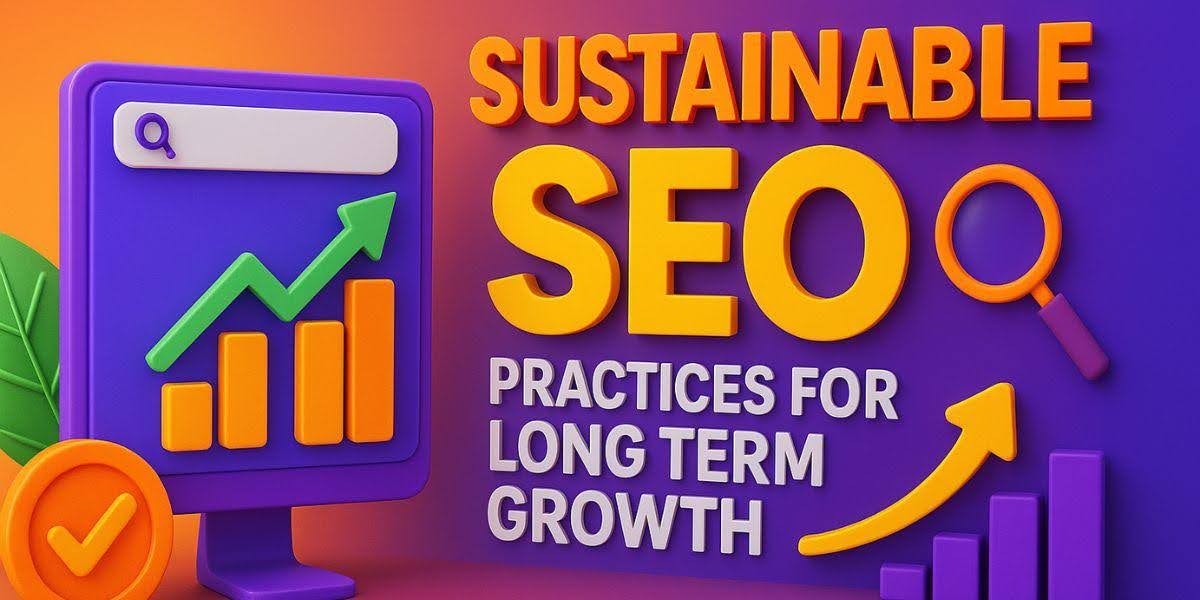Sustainable SEO Practices for Long-Term Growth
SEO | 13-10-2025 | Aisha Gujral

The present search engine optimization is not about short-term wins. Numerous enterprises are interested in the rapid ranking increases, which are not long-lasting. It is important to note that the actual worth lies in coming up with sustainable SEO practices that enable websites to expand progressively and be visible in the long run.
Sustainable SEO is anchored on morals, uniformity, and long-term planning that resonates with the needs of the users as well as the search engines. This implies that it should not cut corners, but rather it should be interested in growing the traffic organically by quality, trust, and user experience.
Long-term policy of SEO is a guarantee of stability. The algorithms of search engines are constantly perfected, and only websites with a stable basis can keep doing well, even because of these alterations. Your short-term gains are resilience, minimized penalty risks, and an established online presence by focusing on sustainable practices.
Core Principles of Sustainable SEO
Focus on White Hat SEO Techniques
Sustainable optimization is based on white hat techniques. Ethical strategies emphasize long-term success, unlike the manipulative approaches, which can only yield short-term outcomes. Some major white hat tactics are:
- Creating original and useful content that provides an answer to real questions.
- Qualifying the backlinks in a natural way of trust and credibility.
- Maximizing search purpose instead of keywords.
- Making sure that the search engine policies are adhered to.
Prioritizing User Experience
Contemporary SEO is user-focused. The quality is determined by search engines based on time on site, bounce rates, and click-through rates. To add and improve user experience, pay attention to:
- Fast-loading pages
- Navigability and simplicity.
- Clear, clear, and well-arranged information.
- Mobile-friendly design
Building Evergreen Content and Authority
The most valuable content is that which is not outdated. It can be guides, tutorials, and industry resources. To develop authority on evergreen content:
- Discuss everything in a broad manner.
- Add new information frequently.
- Be precise and reliable, and supported by data.
Keyword Research for Long-Term Success
Importance of Research in Sustainable SEO
The basis of a winning strategy is keyword research. It is also not possible to develop content that will satisfy users without knowing what they are searching for. Green SEO is not a one-time activity that entails the analysis of keywords.
Balancing High Volume and Long Tail Keywords
- High-volume keywords are useful in getting bigger audiences, but a lot of competition is encountered.
- Long tail keywords are specific, goal-oriented searches that attract visitors who have a high level of engagement.
- This is because a balanced strategy can assist websites in attracting both wide and niche traffic.
Leveraging Semantic Search and Topic Clusters
The contemporary search engines know not only keywords but their context. To match this:
- Divide the content under groups into a pillar page and corresponding subtopics.
- Employ semantically relevant terms and phrases related to the word.
- Emphasize the ability to respond to various parts of a query from the user within a single resource.
On Page SEO Best Practices
Creating SEO Optimized Content
The search engine and the reader should be favored by the optimized content. Best practices include:
- Of course, make use of target keywords in headings, in titles, and in the body.
- Separating content into scannable bits by use of subheadings.
- It can be better interacted with because of the availability of multimedia (e.g. pictures, charts, infographics).
- Cross-linking of Meta titles, descriptions, and links.
Cross Linking of Meta Titles, Descriptions, and Links
- Meta titles should be short, rich in keywords, and attractive.
- Meta description needs to be a brief explanation of what is available on the page and needs to lure clicks.
- Internal linking improves navigation, distributes link equity, and enables users of resources to find related resources.
Page Speed and Mobile Optimization
Google and users prefer fast mobile mobile-friendly sites. To improve these factors, it is necessary to:
- Compressing images
- Using responsive design
- Reducing unnecessary code
The use of browser caching and content delivery networks
Sustainable SEO Content Strategy
Relevant content that lasts for years creates ongoing traffic. Examples include:
- Dictionaries and definitions of industry terms.
- How-to manuals that deal with frequent requirements.
- Detailed resources with general discussion.
Enhancing E E A T Principles
Experience, Expertise, Authoritativeness, and Trustworthiness come as the measures of credibility by search engines. To apply these principles:
- Cite credible sources
- Highlight the author's expertise
- Browse safely using HTTPS.
- Give clear and verifiable information.
Ethical Link Building Strategies
The importance of Link Building
Backlinks are still one of the leading ranking factors. They are endorsements of other websites. But it is quality that counts. One link to somebody to whom we have some degree of trust usually takes precedence over dozens of unrelated links.
Best Practices of Link Building
- Posting on websites that have the right audiences.
- Developing resources and guides that attract links naturally.
- Doing online PR activities to secure mentions in the press.
- Cultivating connections with the influencers and peers in the industry.
Avoiding Spammy Links
The practices that can be unethical such as purchasing of links, linking to link farms or automated link-building software can result in punishment. Building greener linking takes time and sincere efforts.
Long Term Growth Technical SEO
Site Design and URL Optimization
The formatted architecture of the sites assists users and search engines. Suggested measures include:
- Keeping the URLs clean and descriptive
- With a well-defined page hierarchy
- Having only a few clicks to the homepage
Security, crawlability and indexability
- The trust is created by HTTPS, and it is now a ranking factor
- The meta tags and robots.txt are used to manage the indexed pages
- XML is better at search engine discovery
Ordered Data and Schema Markup
Inclusion of structured data assists the search engine in making more sense of the content. Benefits include:
- Search result eligibility to rich snippets.
- Increased listings through improved click-through.
- Improvement in the visibility of local and e-commerce queries.
Optimizing and modifying SEO Strategies
Monitoring Organic Traffic and Ranking
Performance monitoring is good to keep the strategies effective. Use tools to measure:
- Traffic origin increases with time.
- Target Keyword Rankings
- Measures of engagement, which include bounce rate and time spent in a session.
Keeping Pace with the Parameters of the Algorithms
Algorithms in search engines are being changed quite often. To stay aligned:
- Follow the changes in the industry reported by trusted sources in SEO.
- Compare post update changes in traffic.
- Revise action plans without violating ethics.
Top Ten Sustainable SEO errors to avoid
There are numerous companies that fail to do well with SEO due to the repetition of errors. Some key errors to avoid are:
- Excessive use of keywords rather than emphasizing natural language.
- Publication of slender or replicate material.
- Disregarding mobile optimization.
- Overuse of automation without human supervision.
- Not measuring success and not doing analytics.
Long Term Growth Technical SEO
Technical SEO would make sure that Google and other search engines can crawl, index, and interpret your site. With a weak technical base, even the superior content will not perform.
Site Structure and URL Optimization
The site structure is also clear and enhances navigation and understanding of the search engine. The logical categories, descriptive URLs, and structured navigation menus assist visitors as well as the crawlers.
Organized Data and Markup of schema
Including schema markup assists the search engine in interpreting the meaning of your work. Good outputs like FAQS, reviews, and product details enhance visibility and increase clicks.
Ethical Link Building Approaches
Backlinks are still one of the most powerful ranking factors that should be obtained carefully.
Why Link Building Matters for Sustainable SEO
The search engines consider the backlinks as votes of confidence. The affiliation of a well-known site gives an indication that your content is useful. This increases domain authority and facilitates organic traffic.
Best Practices for Earning Quality Backlinks
- Guest Posting on the related websites in order to access new audiences and receive contextual backlinks.
- Online PR through the provision of professional advice or placement in news media.
- Resource Link Building by creating valuable tools, guides, or references that others want to cite
Avoiding Spammy Backlinks
Not all links help SEO. Poor or non-relevant links may hurt your reputation. Sustainable SEO pays attention to credible sources in which the link really helps users.
Possible pitfalls in Sustainable SEO
When developing a sustainable SEO strategy, errors are simple to commit and they lead to less effect in the long term. By being aware of and preventing such errors, you will keep your work progressing.
Over-Optimization and Keyword Stuffing
Stuffing content with excessive keywords may appear to be a strategy of ranking fast, but this is usually not the case. The search engines identify artificial traffic and can demote ranks. Rather, keywords must be used in a natural way.
Mobile First Indexing Should Be Ignored
Google gives more priority to mobile websites in indexing. The inability to optimize towards mobile devices will lead to low ranking and increased bounce. Each of the sites must be mobile, quick-loading loading and navigation.
Short-term strategies that will lead to punishment
There are quick solutions like purchasing backlinks or placing hidden text that can give short-term solutions, but these are not long-lasting. What is more important is that they may lead to punishment that is hard to redeem. Sustainable SEO does not use such dangerous methods.
Failure to refresh and update the Content
Even the most excellent content becomes outdated. The emergence of information that has expired date can be counterproductive to trustworthiness and reduction of interaction. To maintain control, it is necessary to revise and update pages regularly.
Ignoring User Experience
It is not sufficient to have technical optimization. When users are confused, cluttered, or slowed down due to a site, they will not be likely to remain. The signals that are measured by search engines to determine quality include the bounce rate and time on page. An easy ride maintains customers as well as high ratings.
Performance of Mobile Optimization and Page Speed
Mobile optimization has become a necessity with most searches originating from mobile devices. Having a mobile-friendly site informs the customer that it is straightforward to navigate the site and that they will not get bored. The speed of the page is very important to the user experience and search engine positioning. Compression of images, the removal of unnecessary scripts, and effective hosting can be used to enhance performance.
Conclusion
The concept of sustainable SEO is not aimed at getting short-term rankings but rather a sustainable framework. By applying white hat strategies of maximization, creating content that will stand the test of time, and creating ethical connections, companies can create visibility that will be enhanced over time.
Long-term SEO is all about quality and trust. The search engines favor sites that place the users as first priority, frequently update their content, and sites that are credible. With actions to do so, businesses will be able to grow their traffic organically and stay in control in spite of industry competition or changes in the algorithm.
Frequently Asked Questions
What is sustainable SEO?
Instead of quick gimmicks, sustainable seo is long-term expansion utilizing ethical methods and never-ending content, as well as user-focused optimization.
Why then should I give priority to sustainable SEO as compared to fast results?
The quick wins can be short-lived, and sustainable SEO generates power, strength, and steady organic traffic. It minimizes threats of search engine fines.
But what about my knowledge of whether my SEO practices are sustainable or not?
When your practices are in line with the intent of the users, are white hat ethical, and consider the creation of meaningful value, then they are sustainable.
What will be the frequency of my content updates?
Look at your material after every few months. Posts that were written a long time ago can be refreshed and new information added to ensure a high ranking.
What are some examples of ethical link building?
The ethical actions of conducting guest posting on the relevant sites, developing valuable resources, establishing a relationship within the industry, and receiving mentions in digital PR are some of the ethical actions.


.jpg)

.jpg)
.jpg)
.jpg)
.jpg)
.jpg)

